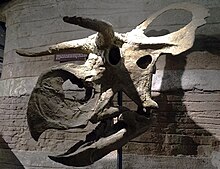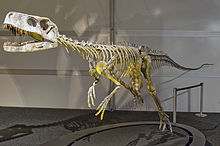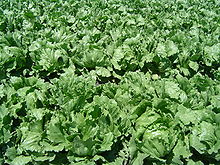Portal:Science
Science portal

Science is a systematic discipline that builds and organises knowledge in the form of testable hypotheses and predictions about the universe. Modern science is typically divided into two or three major branches: the natural sciences (e.g., physics, chemistry, and biology), which study the physical world; and the behavioural sciences (e.g., economics, psychology, and sociology), which study individuals and societies. The formal sciences (e.g., logic, mathematics, and theoretical computer science), which study formal systems governed by axioms and rules, are sometimes described as being sciences as well; however, they are often regarded as a separate field because they rely on deductive reasoning instead of the scientific method or empirical evidence as their main methodology. Applied sciences are disciplines that use scientific knowledge for practical purposes, such as engineering and medicine. (Full article...)
Featured article -
Featured pictures
Vital articles

A society (/səˈsaɪəti/) is a group of individuals involved in persistent social interaction or a large social group sharing the same spatial or social territory, typically subject to the same political authority and dominant cultural expectations. Societies are characterized by patterns of relationships (social relations) between individuals who share a distinctive culture and institutions; a given society may be described as the sum total of such relationships among its constituent members. (Full article...)
Did you know...
- ... that some of the optics for the James Webb Space Telescope were made at the NETPark science park in northern England?
- ... that characters from several different science fiction media appear as an Easter egg in the episode "Babylon's Ashes"?
- ... that the Springfield Science Museum is home to the oldest operating projection planetarium in the United States?
- ... that Australian Madeleine Steere played water polo professionally in Turkey after studying biomolecular science in the United States?
- ... that Science Park station was built despite the objections of the operating agency?
- ... that Godwin Obasi has been described as "Africa's gift to the world of climate science"?
Get involved
| This portal needs to be updated. Please help update this portal to reflect recent events or newly available information. Relevant discussion may be found on the talk page. |

|

|
Science News
- 5 November 2024 –
- Researchers at Kyoto University in Japan launch LignoSat, the world's first wooden satellite constructed without screws or glue, into space. It will orbit Earth for six months. (DW)
- 10 October 2024 –
- In its annual Living Planet report, the World Wildlife Fund estimates that wild populations of animal species have decreased over 70% since 1970, with some high-biodiversity areas seeing up to 95% declines. (DW)
- 10 October 2024 – Tomb of Christopher Columbus
- Researchers from the University of Granada confirm that bones lying in the Seville Cathedral in Seville, Andalusia, Spain, belonged to Christopher Columbus. (ABC Spain)
- 9 October 2024 – Nobel Prize in Chemistry
- This year's Nobel Prize in Chemistry is jointly awarded to British computer scientist Demis Hassabis and American chemist John M. Jumper for their work on protein structure prediction, and to American biochemist and computational biologist David Baker for his work on computational protein design. (The New York Times) (Nobel Prize)
- 8 October 2024 – Nobel Prize in Physics
- American physicist John Hopfield and British-Canadian computer scientist Geoffrey Hinton are awarded this year's Nobel Prize in Physics "for foundational discoveries and inventions that enable machine learning with artificial neural networks". (The Guardian)
- 24 September 2024 –
- Scientists from the University of Waterloo announce that they have positively identified bones found on King William Island in Nunavut, Canada, as those of James Fitzjames, captain of HMS Erebus during Franklin's lost expedition. (CBC News)































































